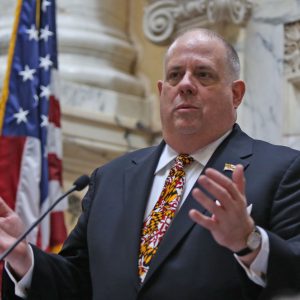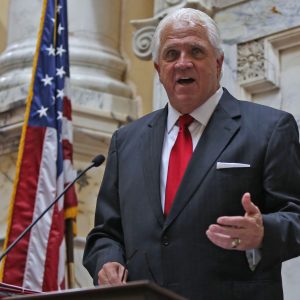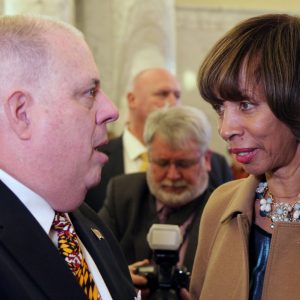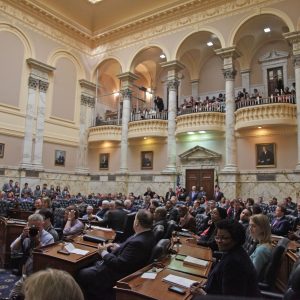ANNAPOLIS, Maryland — The 2017 session of the Maryland General Assembly began Wednesday amid confusion stemming from federal investigations plaguing Democrats and concern among Republicans over the possible override of several vetoes issued by Gov. Larry Hogan at the end of the 2016 session. The Senate is scheduled to begin to debate the vetoes on Jan. 18.
Delegate Michael L. Vaughn, D-Prince George’s, cited health concerns in a two-sentence resignation letter to House Speaker Michael E. Busch, D-Anne Arundel, on Wednesday, raising questions that he may be involved in a federal investigation into corruption on the Prince George’s County Liquor Board.
Vaughn, 59, sat on the House Economic Matters Committee and had been a legislator in the state since 2003.
Two business owners and two board members have already been charged, according to a press release issued Thursday by the U.S. Attorney’s Office.
Although Democrats still have the three-fifths majority needed to override vetoes, their margin has shrunk, at least temporarily, by the sudden resignation of Sen. Lisa A. Gladden, D-Baltimore, due to illness.
Hogan has said he intends to attend the inauguration of President-elect Donald Trump, despite telling the Baltimore Sun that he didn’t vote for the controversial Republican businessman.
Hogan, a Republican, enjoys high approval ratings in a majority Democratic state and refused to endorse Trump during the campaign.
Looking toward the 2018 gubernatorial election, Hogan faces a complicated political arena as many Republican voters will likely expect the governor to support the Republican president. At the same time, his refusal to endorse or support Trump during the election gained him ground among Maryland’s majority liberal voting population.
According to Amelia Chassé, the governor’s deputy communications director, “the governor does what he thinks is right, this is not about political maneuvering; Governor Hogan had a strong relationship with the Obama administration without supporting President Obama.”
Chassé said Hogan’s top priority for the 2017 legislative session remains repealing the Maryland Open Transportation Decision Act of 2016. The bill requires the governor’s office to score transportation funding projects before they receive funding.
The governor’s office refers to the bill as the “roadkill-bill” and Chassé said that it will prevent the administration from moving forward with important projects.
During remarks at Wednesday’s first Senate session, Senate President Thomas V. Mike Miller Jr., D-Calvert, Charles and Prince George’s, told Hogan that the Senate would look at the transportation bill and consider ways to make it “more palatable” to the governor.

Miller also said that the governor’s office and both legislative bodies are united in their commitment to address opioid abuse in the state.
There is wide bipartisan support to fight the heroin and opioid epidemic in Maryland. In previous years, the legislature has addressed the issue by picking “low hanging fruit,” said Delegate Clarence Lam, D-Baltimore and Howard counties, such as by enacting laws that protect people from arrest for calling 911 for an overdose, or by distributing Naloxone, which can reverse the effects of opioids.
Lam and other delegates hope to go further by providing more funding for preventative measures and addiction treatment centers, he said.
Miller praised Hogan’s budget allocations for environmental initiatives.
However, the governor vetoed a 2016 bill that would have increased Maryland’s renewable portfolio standard, which regulates the amount of electricity in the state connected to renewable energy sources.
Also, Sen. Robert Zirkin, D-Baltimore County, said that one of his top priorities in 2017 “is to ban fracking in Maryland.” Zirkin went on to say that “it would be the height of legislative negligence if we failed to do that.”
Maryland currently has a moratorium on fracking that expires later this year.
Baltimore Mayor Catherine Pugh, a former Democratic senator, was a guest on the Senate floor and took a moment to thank the senators who supported her mayoral campaign.
Pugh says that “making sure the funding is in place” for education in the city is one of her administration’s top priorities during the 2017 session.
Shortly after arriving at the State House, Pugh was approached by Hogan, who embraced her in a hug.

Their conversation was muffled, but Hogan could be heard saying enthusiastically “time for a change in Baltimore City” as Pugh nodded and the two separated.
Sen. J.B. Jennings, R-Baltimore County, Harford, said “overall, my priority is to make this a successful session.”
Hogan proposed a sick leave plan late last year that would give Maryland workers five days of paid leave for businesses with at least 50 workers.
While some lawmakers want his plan to have a further reach, it provides a good “starting point for discussions,” Lam said.
Annapolis lawmakers are bracing themselves for the president-elect Trump’s plan to repeal the Affordable Care Act. Without the current level of federal funding for healthcare, Maryland lawmakers may have to scramble to pick up the costs, working within an already tight budget, said Delegate Terri Hill, D-Baltimore and Howard counties.

If the state can’t find the funds, thousands could potentially lose their healthcare, Lam said.
Capital News Service reporters Natalie Schwartz and Jack Chavez contributed to this report.
-30-


You must be logged in to post a comment.